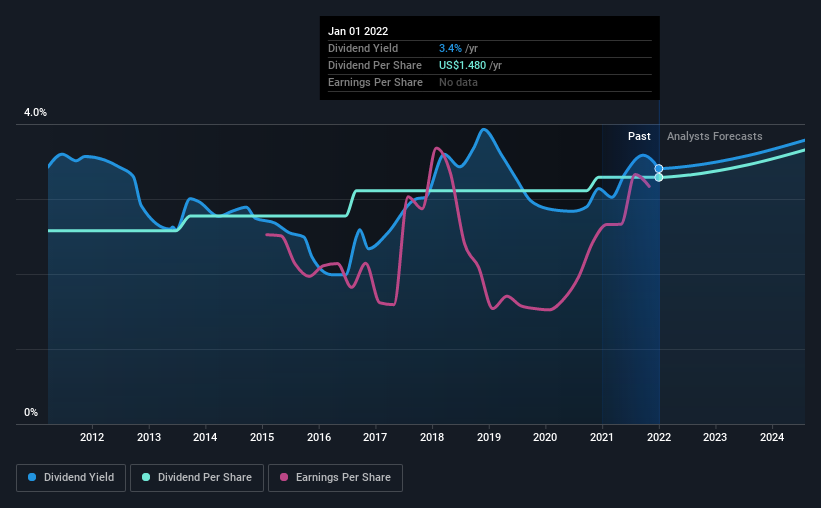Campbell Soup (NYSE:CPB) Has Announced A Dividend Of US$0.37
Campbell Soup Company (NYSE:CPB) has announced that it will pay a dividend of US$0.37 per share on the 31st of January. This means the annual payment is 3.4% of the current stock price, which is above the average for the industry.
Check out our latest analysis for Campbell Soup
Campbell Soup's Dividend Is Well Covered By Earnings
Impressive dividend yields are good, but this doesn't matter much if the payments can't be sustained. Based on the last payment, Campbell Soup was quite comfortably earning enough to cover the dividend. This means that a large portion of its earnings are being retained to grow the business.
EPS is set to fall by 15.6% over the next 12 months. If the dividend continues along the path it has been on recently, we estimate the payout ratio could be 57%, which is comfortable for the company to continue in the future.
Campbell Soup Has A Solid Track Record
The company has an extended history of paying stable dividends. Since 2012, the dividend has gone from US$1.16 to US$1.48. This works out to be a compound annual growth rate (CAGR) of approximately 2.5% a year over that time. Although we can't deny that the dividend has been remarkably stable in the past, the growth has been pretty muted.
Campbell Soup Could Grow Its Dividend
Investors could be attracted to the stock based on the quality of its payment history. Campbell Soup has impressed us by growing EPS at 8.2% per year over the past five years. Since earnings per share is growing at an acceptable rate, and the payout policy is balanced, we think the company is positioning itself well to grow earnings and dividends in the future.
We Really Like Campbell Soup's Dividend
In summary, it is good to see that the dividend is staying consistent, and we don't think there is any reason to suspect this might change over the medium term. The earnings easily cover the company's distributions, and the company is generating plenty of cash. However, it is worth noting that the earnings are expected to fall over the next year, which may not change the long term outlook, but could affect the dividend payment in the next 12 months. All of these factors considered, we think this has solid potential as a dividend stock.
Market movements attest to how highly valued a consistent dividend policy is compared to one which is more unpredictable. However, there are other things to consider for investors when analysing stock performance. For instance, we've picked out 1 warning sign for Campbell Soup that investors should take into consideration. If you are a dividend investor, you might also want to look at our curated list of high performing dividend stock.
Have feedback on this article? Concerned about the content? Get in touch with us directly. Alternatively, email editorial-team (at) simplywallst.com.
This article by Simply Wall St is general in nature. We provide commentary based on historical data and analyst forecasts only using an unbiased methodology and our articles are not intended to be financial advice. It does not constitute a recommendation to buy or sell any stock, and does not take account of your objectives, or your financial situation. We aim to bring you long-term focused analysis driven by fundamental data. Note that our analysis may not factor in the latest price-sensitive company announcements or qualitative material. Simply Wall St has no position in any stocks mentioned.

 Yahoo Finance
Yahoo Finance 
